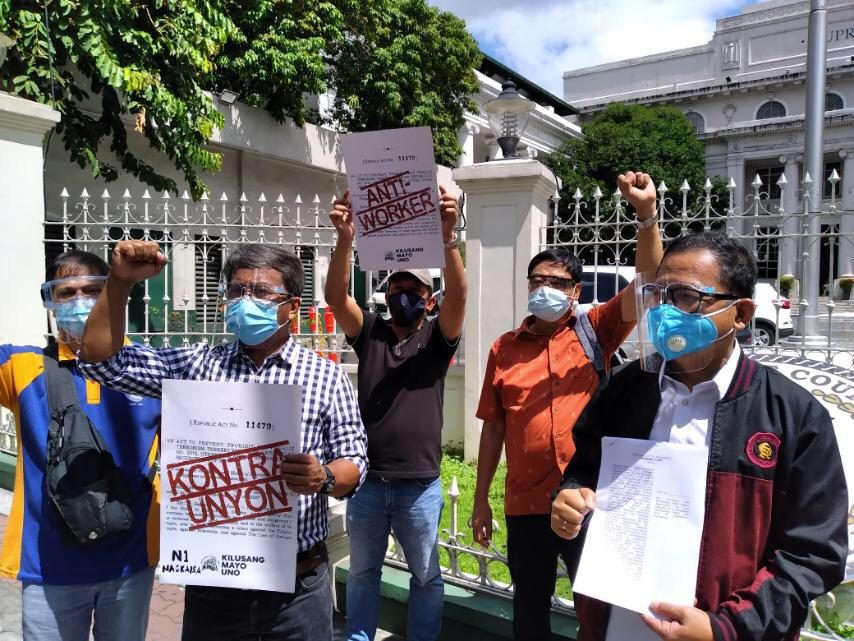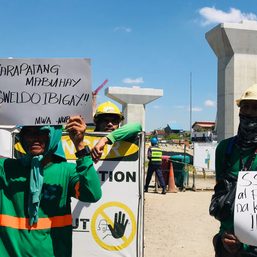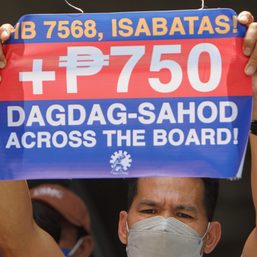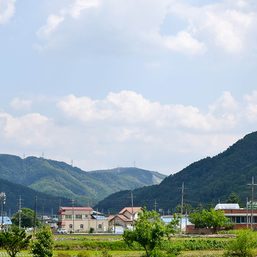SUMMARY
This is AI generated summarization, which may have errors. For context, always refer to the full article.

Labor groups became the latest petitioners against the anti-terror law on Thursday, July 16, focusing their argument on the power of the Anti-Terror Council to designate people as terrorists, and how guilt by association threatens the liberty of common workers.
The Federation of Free Workers (FFW), Nagkaisa Labor Coalition (Nagkaisa) and Kilusang Mayo Uno (KMU) led the filing of the petition – the 9th, so far, against the controversial measure – before the Supreme Court on Thursday. The number of petitioners is expected to exceed a dozen.
The latest petition zeroed in on Section 25 of Republic Act No. 11479, which authorizes the Anti-Terror Council to designate people and groups as terrorists based only upon its own finding of probable cause. Upon its designation, the Anti-Terror Council can ask the Anti-Money Laundering Council to freeze the assets of the suspects.
Designation is a separate power from proscription, which is done by a court after a trial.
The petitioners said the designation power is a form of the prohibited bill of attainder, or legislation that impute guilt without a trial.
The Constitution prohibits bills of attainder. (READ: EXPLAINER: Comparing dangers in old law and anti-terror bill)
Section 25 also provides that the Philippines will automatically adopt the terrorist list of the United Nations Security Council.
“Paragraphs 1 to 3 of Section 25 of the R.A. No. 11479 are bills of attainder, as one who is in the list of terrorists or terrorist organizations of the United Nations Security Council Consolidated List is automatically considered as such in our jurisdiction without the benefit of being informed of the nature of the cause and the accusation against him and sans trial,” said the petition.
Guilt by association
The petition said common workers are vulnerable, because the law has also deemed as a crime membership to the terror organization, as well as participating in the planning of, inciting to, and threatening the commission of a terror act.
The Department of Justice (DOJ) had earlier sought to tag as terrorists some known and prominent activists, as well as UN special rapporteur Victoria Tauli-Corpuz, but it later trimmed down the list after it was exposed as unverified. (WATCH: The dangers of the Anti-Terrorism Law)
The Philippine National Police also has an ongoing policy of stopping “radical union infiltration” in industrial zones in Central Luzon, said the petition.
“Under this provision, citizens or ordinary people who merely express their positive opinions or hold a banner, written document, or paraphernalia tending to favor a protest or mass action tagged as a terrorist initiative would be affected and prejudiced by this provision,” said the petition.
“Even giving food, money, or any support to a dependent son or daughter who is tagged or suspected of being a terrorist is fatal as the same is a crime of providing material support to a terrorist,” it added.
The petitioners said this can empower the Anti-Terror Council to arrest these people without warrants, and detain them for up to 24 days without being charged, as authorized by the highly-contested Section 29.
“This is guilt by association and one can be deprived of his liberty even by mere suspicion under Section 29 of the assailed law,” said the petition.
Here is a list of petitions that have been filed against the new law so far:
- Atty Howie Calleja and group
- Albay 1st District Representative Edcel Lagman
- Far Eastern University Institute of Law
- Makabayan bloc
- Former OGCC chief Rudolf Jurado
- Center for Trade Union and Human Rights
- Framers of the Constitution with Ateneo and Xavier lawyers
- Sanlakas party list
- Labor groups
The anti-terror law is supposed to take effect on July 18. – Rappler.com
Add a comment
How does this make you feel?


![[Episodes] Fairness to freelancers](https://www.rappler.com/tachyon/2024/02/Freelance-Writers-Guild-of-the-Philippines-rate-guide.jpg?resize=257%2C257&crop=217px%2C0px%2C720px%2C720px)


There are no comments yet. Add your comment to start the conversation.